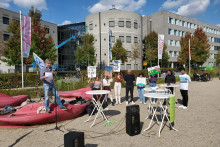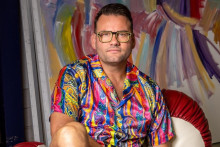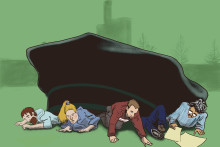For university professor Albert van den Berg, the tipping point came a few years ago, when, during a mountain hike with his daughter in Switzerland, he saw that over a hundred metres of glacier ice had disappeared like snow in the sun. 'Of course, you read about the impact of climate change on glaciers. But when you get to see it with your own eyes, that is... confronting. Then I realised: how will I ever explain it to my children, if I did not do anything about it?'
Two years ago, science sociologist Guus Dix read the book Onleefbare Aarde (Uninhabitable Earth) out of 'academic enthusiasm'. A few weeks later, he joined a protest by the climate activist movement Extinction Rebellion. Since then, he has been arrested several times and he recently founded a UT branch of the activist group Scientist Rebellion.
For professor Jurriaan Schmitz, assistant professor Cheryl de Boer and PhD candidate Patricia Reyes, there was less of a sudden paradigm shift, but their climate concerns had been bubbling under the surface for some time. The same applies to them as for Dix and Van den Berg: their awareness and their actions grew over the years. Houses were made more sustainable, consumption dropped, electric cars have been purchased, they changed to a vegetarian or vegan diet, clothes are only bought or swapped second-hand, and they fly less – or stopped flying altogether. In other words, the climate bingo card of this crowd was full in no time.
'Being judgemental, condemning and putting the responsibility on the individual don't help, that just drives people away'
‘Not a competition’
But their approach turns out to be anything but dogmatic or pedantic. ‘I try not to see the climate crisis as someone else's problem, but try to see what I can do myself,’ says De Boer. ‘With today's knowledge, I am very pessimistic about the future. If I worry too much about the big picture, I am afraid it will suck all the energy out of me.’ ‘There is no use trying to compare ourselves to each other. It is not a competition,' adds Van den Berg. ‘I had not flown during corona times and limited myself to just a few necessary flights this year. I try my best to reduce my ecological footprint, but nobody is perfect. Simply by living on this earth, it means you are emitting.'
Reyes sums up the sentiment: 'I think many people are sufficiently informed and concerned – especially within the university – but they are also scared and don't see a solution. Being judgemental, condemning and putting the responsibility on the individual don't help, that just drives people away. Instead, we should show people that there is hope as long as there is action. Every individual has a role to play, but our individual efforts are more effective when we use them to ensure systemic change.'

Tech-focused climate programme
For that systemic change, the five interviewees see a role for UT itself, although views differ on how. Professors Schmitz and Van den Berg see solace mainly in the beaten, official paths. For instance, some time ago Van den Berg was appointed sponsoring dean of sustainability by the Executive Board, where he works together with De Boer, among others. Their ‘mission’, according to Van den Berg: ‘We have so much knowledge, expertise and potential on board at this university. Why don't we deploy that more for the climate?'
Specifically, they are thinking of multiplying multidisciplinary research and setting up a technology-focused climate programme. For this to happen, however, it is important that UT staff know how to find each other, according to the university professor. ‘We must take advantage of the fact that we are a small university with short lines of communication. A lot is already happening at UT, but there is a lot to be gained in coordination, visibility, and cooperation. People are bursting with energy, but they don't know where to use it. We must do everything we can to get them in the right position,' says the professor. The reality is still unruly, especially in the field of research, De Boer adds. 'If you want to get funding for a project, you have very little chance to get it if you submit a proposal from but one university. There are great opportunities for internal cooperation, but the system is far from set up for it. Ideally, all the research we do in the future should be mission-related, with a clear climate component.'
'Scientists tend to see flying to conferences as a fringe benefit'
Beaten paths
Last year, Schmitz decided to make a virtue of a necessity and started a UT-wide minor on energy transition with twenty-five colleagues from all faculties. 'Because there was no such thing yet. If you think something is not going well, you can go and complain. But you can also try to change it yourself,' he says. There is no shortage of enthusiasm among students. In the first pilot year, twenty students took the minor compared to no less than 69 last quartile. Next year, Schmitz hopes for more than a hundred participating students.
Schmitz is also explicitly concerned with energy consumption in Carré and the NanoLab ('it starts with what equipment you bring in') and the flying behaviour of scientists and the CO2 offsetting of flights. Schmitz himself has not been flying intercontinental for six years, and since 2019 he stopped flying altogether. 'Scientists tend to see flying to conferences as a fringe benefit. And I understand very well that researchers see them as important moments for networking. Everyone has to make their own assessments, but I do think we can be more selective in which conferences we – physically - attend. The more scientists and universities join such a movement, the sooner the conference world will adapt to it.'
That a fairly ready proposal for CO2 offsetting flights did not get the green light from the Executive Board last summer does sting him. 'Even though I was involved in the process, I had to hear it in the corridors that faculties now have to make their own plans. That while a central guideline could have brought much more clarity and faster change.' However frustrating, Schmitz resigns himself to his role. 'It comes down to influence without power. Those beaten paths are a big limitation, but I find my way. I want to create as much support as possible without overplaying my hand.'
'Sever ties with Shell'
Dix and Reyes have different views than Schmitz. 'We have been trying to do the same thing as scientists for thirty years; we come up with facts, reports, and advice. As far as I am concerned, that approach does not fit the emergency we are in now,' says Dix. 'In 1990 already, we knew that we were going in the wrong direction. We have allowed it to get so far in thirty years that we now have less than seven years left to stay below that one-and-a-half degree warming up of the earth and thus still have a reasonable chance of having a liveable planet for humans, animals and plants.'
With Scientist Rebellion at UT – now a group of ten – Dix therefore chooses the path of 'civil disobedience'. For instance, he was also recently involved in the blockade of private jets at Schiphol Airport. The first action on campus is yet to come. 'There has to be some friction, otherwise you won't bring about change. But it is not protesting for the sake of protesting. I always remain peaceful, open and in dialogue.'
'If this university was really ‘People-first’, we would stop the cooperation with Shell immediately.'
What Dix wants for sure is for UT to sever all ties with the fossil industry. 'Such a sustainability week, this week... Do we then also celebrate our ties with Shell? Because they are widely represented at UT. We gain nothing with feel-good sustainability. I say: tell the real story.' Reyes - also a member of Extinction Rebellion as well as University Rebellion - is equally vehement about this. 'Radical change at the UT is pushed mainly from bottom-up, although I do see good intentions at the executive tables. Still, it’s unacceptable we haven’t severed all ties with Shell; a company that knowingly exploits people and ecosystems. If this university was really ‘People-first’, we would stop that cooperation immediately.'
The PhD candidate again insists on the importance of systemic change. 'I see the climate crisis as a symptom of our social problems. We live in a capitalist system where growth at the expense of the planet is the default, where profit determines the morals and values of communities, rather than solidarity and cooperation. However, people are afraid to explore alternatives,' argues Reyes. 'But an activist does not conform to the way things are. We imagine and test new systems while being stuck on our current one. And trying to get as many people as possible on board in that.'
'Society and politicians can no longer expect us to shut up and write our reports'

The activist and the scientist
Then the question remains: the activist and the scientist, can they co-exist in harmony? 'Without a doubt,' says De Boer. 'When we talk about the climate crisis, sitting in the ivory tower no longer suits us. We are far from knowing everything, but we know enough to realise a disaster is inevitable if we don't act. I am a scientist, but I also have an opinion. And I am not going to hide or gloss over anything.' Dix agrees with her. 'Scientists have a role in this society. In providing information, that role has been incredibly important, but reporting is no longer enough. It is time for scientists to make a statement.' Reyes adds: 'We are not only scientists, but we are also inhabitants of this planet. Society and politicians can no longer expect us to shut up and write our reports.'
Above all, the motto seems to be: do what is within your power. 'Look at how climate activists recently glued themselves to paintings,' says Van den Berg. 'Such an action is born out of powerlessness; if this is what is within your power and this is the only way you can scream for attention, I understand. I will not glue myself down, but I can use my role, for example, to organise symposia on climate and sustainability in a KNAW context and try to push for change at UT. It may look bad for our planet, but I am a born optimist. If we really want something as humans, we can do a lot. Then we also have to sacrifice something for it. We are disregarding our planet by living beyond our means.'







